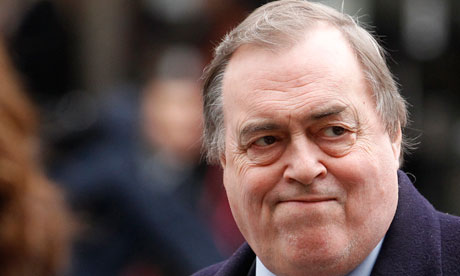The post title doesn't quite sum up former Labour deputy-PM John Prescott's argument, which is a very, very useful one as it
- brings up issues around digitisation ...
- and the decline of newspaper circulation (there are 10m UK Twitter accounts, while 9m papers are sold each day)
- the failures of the PCC, and how Twitter users are more effective than it: he compares his experience of complaining about a Photoshopped image used to brand him as a 'champagne socialist' (he was drinking a bottle of beer which was cropped out of the shot) - it took weeks to get an apology - with a June 2011 story in The Sunday Times about him criticising new Labour leader Miliband: he tweeted that this was simply a made-up lie, and within HOURS The Sunday Times issued an apology
- the failure of the press to carry out its democratic function as a 'fourth estate'
- ...not least over the refusal of the press to report the Guardian's revelations about phone hacking until after the Milly Dowler revelations led to the closure of the NoTW - he says it was the incessant discussion of this on Twitter that ensured the Guardian's reporting eventually had an impact
- he also notes the role of advertisers: it was after a growing number of big-name companies announced they would cease advertising in the NoTW that it was closed
- fundamentally, he argues that Twitter enables the people to carry out the scrutinising role, holding politicians to account, that the press/media are traditonally meant to
Here's what he said on
http://www.guardian.co.uk/politics/2012/may/15/life-is-tweet-john-prescott:
Life is tweet, says John Prescott, as Twitter reaches 10m milestone in UK
Twitter has helped shift the balance of media power from press barons to the people – a true champagne moment
 |
John Prescott says the 10,000,000th UK
Twitter subscriber is a milestone and a true champagne moment.
Photograph: Andrew Winning/Reuters
|
Tuesday marked a turning point for the UK mainstream media. The combined total of people who buy daily national newspapers is 9,002,963. The number of people on Twitter in the UK is now 10 million.
Where
once press barons were courted by politicians and PRs, the people have
now established their own media. It costs nothing, is faster than
mainstream media and galvanises people into action.
Back in 1996, I went to a do with Pauline. A photographer took a picture of us at our table. The following day the London Evening Standard ran a picture with the caption "champagne socialist".
There
was no bottle of champagne at our table – the paper had cropped the
picture to make a bottle of Becks look like a bottle of Moët. Another
beer near my hand was airbrushed out completely.
I complained but, after a few days, I'd heard nothing. So I released a statement which was published in the Independent and, eventually after weeks, I received an apology from the Standard.
In June 2011, the Sunday Times
wrongly reported I had told "friends" that my party's new leader had
not made "a good start" to his leadership. The headline read "Labour Big
Beasts Maul Ed Miliband".
I tweeted: "I see there's a quote purporting to be from me in the Sunday Times. It's completely made up. An absolute lie."
Within
an hour, the paper replied "Due to a prod[uction] error a quote was
wrongly attributed to @johnprescott. We apologise for the confusion
& are happy to set the record straight."
Both stories
illustrate how power in the media has shifted dramatically. Twitter has
created an important and speedy check on our newspapers – a role the Press Complaints Commission (PCC) failed miserably to fulfil – and finally made press barons accountable to the people.
Even Rupert Murdoch, who vented his spleen in Sun editorials, realised the power shift and cut out the middleman by finally joining Twitter in January.
The Jan Moir Twitter storm
about her terrible Daily Mail piece on Stephen Gately's "sleazy" death
led to thousands of tweeters, myself included, posting the link to
officially complain to the PCC. A record 25,000 did and Moir was forced
to apologise.
Twitter users also bombarded News of the World's advertisers
after accusations it had hacked Milly Dowler's phone. O2, Boots,
Halifax, Dixons, Sainsbury's, the Co-op, npower and Ford all withdrew
their advertising and the paper was closed within a week.
Social
media also helped set up the Leveson inquiry. While very few media
outlets covered the Guardian's original phone-hacking investigations in
2009 in any detail, it was kept alive on Twitter as new information
emerged.
They wouldn't let it lie and the mainstream media were
ultimately compelled to investigate the story, leading to a critical
mass of public anger and official action.
Twitter is OUR media, the public have become the news editors and the Twitter trend list is the running order.
It's given me a voice and a connection to millions of people that the distorted prism of the mainstream media denied.
So for me, life is tweet. Though it would be even tweeter if they verified me.
LOL!
• John Prescott is the former deputy prime minister. He joined Twitter on 22 January 2009 and presently has almost 132,000 followers.


No comments:
Post a Comment
Comments and suggestions are very welcome ... but please ensure all comments are appropriate! All comments are moderated before publication. Spam will be reported